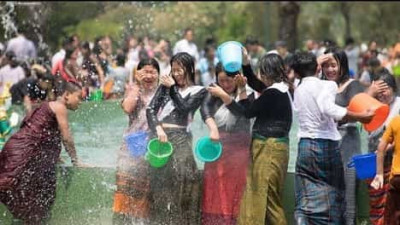History & Traditions
The Meaning and Spirit of Sangken
The word “Sangken” is derived from the Tai language, meaning “movement” or “change of time,” signifying the transition from the old year to a new one. For the Khamti and Singpho communities, this festival goes beyond celebration — it’s a sacred expression of gratitude, purification, and spiritual awakening. The rituals performed during Sangken symbolize the cleansing of the mind and body to welcome peace, prosperity, and harmony into the new year.
Rituals and Ceremonies of Sangken
Sangken is observed over three days, each filled with devotion, joy, and community spirit:
-
Day 1 – The Farewell of the Old Year:The first day begins with the cleaning of homes, monasteries, and Buddha statues. Water is poured over Buddha idols as an offering of purification, signifying respect and renewal.
-
Day 2 – The Day of Merit:On this day, Buddha images are ceremonially bathed in clean, scented water and placed in sacred shrines. Devotees make offerings of flowers, food, candles, and alms to monks. Temples echo with Buddhist chants and prayers for peace and compassion.
-
Day 3 – The New Year Celebration:The final day is marked by joyful water-splashing, where people sprinkle and splash water on one another as a gesture of goodwill, friendship, and cleansing of negativity. The community gathers for cultural performances, traditional dances, and feasts featuring local delicacies.
Cultural Highlights of Sangken Festival
Religious and Social Importance of Sangken Festival
Sangken is not just about water play; it carries deep spiritual symbolism. Water represents purity — by bathing the Buddha idols and each other, devotees cleanse their souls and start anew. The festival also reinforces social harmony, mutual respect, and inter-community ties. It’s a reminder of the Buddhist principle that compassion and cleansing of the heart lead to enlightenment.
Modern Relevance and Tourism at Sangken Festival
In recent years, Sangken has drawn national and international attention for its eco-friendly and peaceful celebrations. With growing interest in tribal tourism and spiritual experiences, the festival offers a unique opportunity to witness a living Buddhist heritage within India’s Northeast. Government and local cultural bodies have also started promoting Sangken as a major ethnic tourism event, ensuring that traditional values are preserved while welcoming global visitors.
Conclusion
The Sangken Festival of the Khamti and Singpho tribes beautifully portrays the essence of renewal, purity, and unity. It’s not just a festival—it’s a reflection of life’s eternal flow, a reminder to let go of the past and begin anew with peace and goodwill. For travelers seeking a cultural immersion in Assam or Arunachal Pradesh, Sangken offers an unforgettable experience where water becomes a symbol of wisdom and awakening.
Sangken Festival Quick Info Table
| Festival Name | Sangken Festival |
|---|---|
| Celebrated By | Khamti and Singpho tribes |
| Religion | Theravada Buddhism |
| Type of Festival | Water Festival / New Year Celebration |
| Duration | 3 Days (April 14–16) |
| Main Locations | Namsai, Chowkham, Bordumsa, Tinsukia, Dibrugarh |
| Key Rituals | Bathing Buddha idols, water splashing, prayers, feasts |
| Cultural Activities | Dances, music, community feasts, offerings |
| Significance | Purification, renewal, peace, and prosperity |
| Tourism Importance | Major Buddhist cultural festival in Northeast India |
Sangken Festival FAQs
-
What is Sangken Festival?
Sangken Festival is the Buddhist New Year celebration of the Khamti and Singpho tribes in Assam and Arunachal Pradesh. -
When is Sangken celebrated?
It is celebrated every year from April 14 to 16, marking the arrival of the new year and the spring season. -
What is the meaning of Sangken?
Sangken means “movement” or “change of time” in the Tai language, symbolizing transition and renewal. -
Why is water used in Sangken Festival?
Water represents purification and the washing away of sins and misfortune to welcome peace and prosperity. -
Where is Sangken Festival mainly celebrated?
The festival is observed in Namsai, Chowkham, Bordumsa (Arunachal Pradesh), and Tinsukia, Dibrugarh (Assam). -
Which communities celebrate Sangken?
The Khamti and Singpho tribes, followers of Theravada Buddhism, primarily celebrate the festival. -
What are the main rituals of Sangken Festival?
The bathing of Buddha statues, water sprinkling, temple offerings, and community feasts are key rituals. -
Is Sangken similar to Songkran or Thingyan?
Yes, it shares similarities with Thailand’s Songkran and Myanmar’s Thingyan water festivals. -
What foods are prepared during Sangken?
Traditional dishes like rice cakes, curries, and herbal drinks are prepared and shared in community feasts. -
Can tourists attend Sangken Festival?
Yes, the festival is open to visitors, offering a unique experience of Buddhist culture and hospitality.
